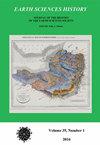Using Oscillatory Processes in Northern Hemisphere Proxy Temperature Records to Forecast Industrial-era Temperatures
IF 0.6
4区 哲学
Q4 GEOSCIENCES, MULTIDISCIPLINARY
引用次数: 1
Abstract
The validity and interpretation of differing representations of proxy temperature profiles from the past 2,000 years for the northern hemisphere remains controversial. One perspective of temperatures over the past 1,000 years embodies a major oscillation with a peak corresponding with the Medieval Warm Period (MWP), a trough representing the Little Ice Age (LIA) and subsequent increasing temperatures to the present. An alternate temperature perspective, known as the “hockey stick” exhibits a slow long-term cooling trend downward from about 1000 AD to about 1900 AD, followed by relatively rapid warming in the 20th century and is a prominent feature in describing the apparent climate crisis. The present study, using spectral analysis, shows that both types of profile have a dominant millennial oscillation and a set of lower power centennial and decadal oscillations. The key difference in determination of development of the proxy temperature profile into either a hockey stick or MWP_LIA cycle is the phase alignments of centennial and decadal oscillations with respect to the millennial oscillation. In both cases, the resultant sine waves from spectral analysis up to 1880 AD can be used to train a an artificial neural network using oscillatory data corresponding to the pre-industrial era, then forecasting temperatures into the 20th century, enabling an estimation of natural and anthropogenic contributions to recent warming. The limitations of highly complex general circulation models that do not to adequately incorporate oscillatory patterns in temperatures may be a compelling reason to promote more extensive use of forecasting with established machine learning techniques such as ANNs.利用北半球代用温度记录的振荡过程预测工业时代温度
过去2000年北半球代用温度曲线的不同表示的有效性和解释仍然存在争议。过去1000年的一种温度视角体现了一个大振荡,其峰值对应于中世纪暖期(MWP),波谷代表小冰期(LIA)和随后的温度上升到现在。另一种被称为“曲棍球棒”的温度观点显示,从公元1000年左右到1900年左右,气温呈缓慢的长期下降趋势,随后在20世纪出现了相对快速的变暖,这是描述明显气候危机的一个突出特征。本研究利用谱分析表明,这两种类型的剖面都有一个主导的千年振荡和一组低幂次的百年振荡和年代际振荡。确定代用温度廓线发展为曲棍球棒周期或MWP_LIA周期的关键区别在于百年和年代用振荡相对于千年振荡的相位排列。在这两种情况下,频谱分析所得的正弦波可用于训练人工神经网络,使用与工业化前时代相对应的振荡数据,然后预测进入20世纪的温度,从而能够估计自然和人为对近期变暖的贡献。高度复杂的大气环流模型不能充分纳入温度的振荡模式,这可能是促进更广泛地使用人工神经网络等已建立的机器学习技术进行预测的一个令人信服的理由。
本文章由计算机程序翻译,如有差异,请以英文原文为准。
求助全文
约1分钟内获得全文
求助全文
来源期刊

Earth Sciences History
GEOSCIENCES, MULTIDISCIPLINARY-HISTORY & PHILOSOPHY OF SCIENCE
CiteScore
1.00
自引率
0.00%
发文量
1
审稿时长
>12 weeks
期刊介绍:
Earth Sciences History promotes and publishes historical work on all areas of the earth sciences – including geology, geography, geophysics, oceanography, paleontology, meteorology, and climatology.
The journal honors and encourages a variety of approaches to historical study: biography, history of ideas, social history, and histories of institutions, organizations, and techniques.
Articles are peer reviewed.
 求助内容:
求助内容: 应助结果提醒方式:
应助结果提醒方式:


